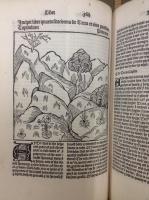Michael Twomey (English, Dana Professor, Emeritus) publishes on John
Trevisa in Oxford Bibliographies Online.
03/05/20
Contributed by Chris Holmes
 Michael Twomey (English, Dana Professor of Humanities and Arts, Emeritus) has published a comprehensive research guide to the medieval English writer John Trevisa (ca. 1342-1402) in Oxford Bibliographies Online’s Medieval Studies section, ed. Paul E. Szarmach; DOI: 10.1093/obo/9780195396584-0279 (9,500 words). OBO offers scholars reliable and up-to-date introductions to hundreds of topics.
Michael Twomey (English, Dana Professor of Humanities and Arts, Emeritus) has published a comprehensive research guide to the medieval English writer John Trevisa (ca. 1342-1402) in Oxford Bibliographies Online’s Medieval Studies section, ed. Paul E. Szarmach; DOI: 10.1093/obo/9780195396584-0279 (9,500 words). OBO offers scholars reliable and up-to-date introductions to hundreds of topics.
Trevisa, an exact contemporary of the poet Geoffrey Chaucer, is credited with proving that English prose was capable of conveying nuanced theological, political, and historical arguments at a time when the preferred language for serious prose was Latin. He is best known for his translations of Ranulf Higden’s Polychronicon, a universal history ending in 1352, and of Bartholomaeus Anglicus’s On the Properties of Things, an encyclopedia of the natural world composed in the mid-thirteenth century. Trevisa’s translation of On the Properties of Things was one of the earliest books printed in England (1491) after the first printing press arrived in England. Reprinted twice in the sixteenth century, it has been called “Shakespeare’s encyclopedia” because of Shakespeare’s many apparent references to information in it.
After an introduction, Twomey’s essay covers overviews of scholarship, Trevisa’s biography, Trevisa’s supposed involvement in the “Wycliffite” movement to translate the Bible into English; Trevisa’s original prose and poetry; his translations from Latin; and his role in the development of English prose. Each section is followed by an annotated bibliography of recommended scholarship.
*Illustration: The opening page of Book XIV (on the earth) from Wynkyn de Worde’s 1491 edition of Trevisa’s English translation of On the Properties of Things (Columbia University library; photo: Michael Twomey).
1 Comments
https://www.ithaca.edu/intercom/article.php/20200303154728818
 Michael Twomey (English, Dana Professor of Humanities and Arts, Emeritus) has published a comprehensive research guide to the medieval English writer John Trevisa (ca. 1342-1402) in Oxford Bibliographies Online’s Medieval Studies section, ed. Paul E. Szarmach; DOI: 10.1093/obo/9780195396584-0279 (9,500 words). OBO offers scholars reliable and up-to-date introductions to hundreds of topics.
Michael Twomey (English, Dana Professor of Humanities and Arts, Emeritus) has published a comprehensive research guide to the medieval English writer John Trevisa (ca. 1342-1402) in Oxford Bibliographies Online’s Medieval Studies section, ed. Paul E. Szarmach; DOI: 10.1093/obo/9780195396584-0279 (9,500 words). OBO offers scholars reliable and up-to-date introductions to hundreds of topics.